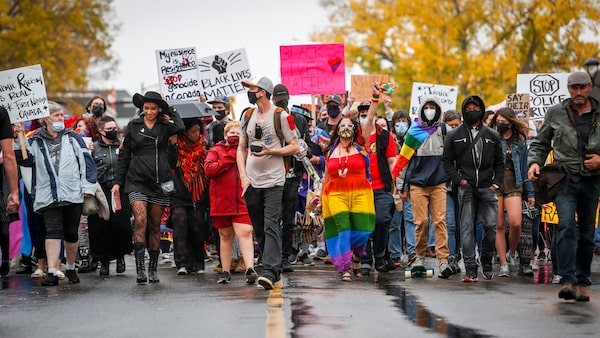Avvy Go is the clinic director at the Chinese & Southeast Asian Legal Clinic. Gary Yee is director of the Chinese Canadian National Council for Social Justice.

Demonstrators march down a main street during an anti-racism event in Red Deer, Alta., Sunday, Oct. 4, 2020.Jeff McIntosh/The Canadian Press
Many Canadians have experienced intense emotions watching the election unfold in our neighbour to the south. Those of us fighting for social justice have feared the possibility of four more years of Donald Trump and the continuing destructive impact on society, well beyond the U.S. borders. We experience something visceral and deeply personal when we see the dehumanization of those who belong to communities with less power and privilege. Speaking as Chinese-Canadians, the increased anti-Asian racism this year has increased our sense of being the “other" – being the perpetual foreigner. All our institutions, including the powerful media, must do better to ensure our social cohesion and cherish our collective humanity.
Chinese-Canadians continue to be treated as foreigners, despite our more than 150 years of history in this country. Nov. 7, 2020, marked the 135th anniversary of the Last Spike ceremony for finishing the Canadian Pacific Railway in 1885. During its construction, Chinese labourers were paid less than other workers and did the most dangerous jobs; hundreds died and were often buried in unmarked graves. Our community’s contribution to this nation-building was repaid with 67 years of legislated racism, first with the exorbitant Chinese Head Tax in 1885 to restrict Chinese immigration, followed by the Chinese Exclusion Act that banned Chinese immigration outright in 1923 until 1947.
Despite our long history in Canada, today Chinese-Canadians are still seen as outsiders who bring in diseases or drive up the housing market. With the rising tensions between Canada and China – a country that is not even the birthplace of many Chinese-Canadians – our loyalty to Canada is increasingly being questioned.
The pandemic has exposed how deep-seated anti-Chinese racism is in Canada. Across the country, social media have been flooded with heart-wrenching reports of verbal and physical attacks on Chinese-Canadians and other Asian-Canadians.
With Black Lives Matter, and other anti-racism movements across North America, more Canadians are becoming aware of the existence of structural racism in our own backyard. Still, far too many Canadians either regard this as an issue that exists only south of the border, or that racism is just a matter of “a few bad apples.”
Sensationalism in the media gives lots of attention to explicitly racist incidents, without shining enough light on the everyday lived experiences of racialized people who face systemic barriers in the workplace, health care, justice system and elsewhere. Nor have the media done enough of a deep dive into Canada’s history of colonization of Indigenous peoples and the transatlantic slave trade, as well as the continuing impact of such atrocities.
As the Far Right movement has taken to social media to spread hate and misinformation, the role of traditional media as a source of trusted information has become ever more important The media hold tremendous power as the disseminator of information to the general public. But with that power, media also have an obligation to ensure that they do not become part of the problem.
To help move our society from one where racialized folks are being “othered” as lesser humans to one where all people belong as equal participants, influential media outlets have the power and opportunity to step up and support inclusion and belonging for all.
Media outlets need to become more inclusive and involve all racialized communities in issues of interests to all Canadians, and not just stories that are perceived as affecting them only. For instance, don’t interview Chinese-Canadians only when the media are doing a story on China and Hong Kong, or on the real estate market in Vancouver, but talk to us also about the Canadian economy, or climate change. We share very similar interests, experiences and expertise with all Canadians.
It’s important for media outlets to adopt an anti-racist approach to their work, including systemic policies and practices. They must be mindful of the impact of choices for stories, headlines and content, to avoid worsening racism or reinforcing the stereotype of Chinese-Canadians and others as perpetual foreigners.
Journalists and media leaders need to appreciate and understand every racialized community as a diverse one and stop treating us as a monolithic entity. No person of colour or Indigenous person should be expected to speak for their entire community before their perspective is rendered worthy of publication.
The past several years of turmoil both in the United States and in Canada have taught us that our democracy is fragile, and that structural racism, if left unchecked, poses a serious risk to social cohesion. There’s so much damage to be undone when those with power and privilege try to dehumanize others. Each of us experiences racism and forms of “othering” in different and deeply personal ways. By working as a bridge, media can amplify the true reality of our entire society, and use its incredible power to transform how we see ourselves and one another. We need to start reclaiming some of our humanity and rebuilding our society based on principles of justice and equality.
Keep your Opinions sharp and informed. Get the Opinion newsletter. Sign up today.